Importance And Health Benefits of Home Gardening
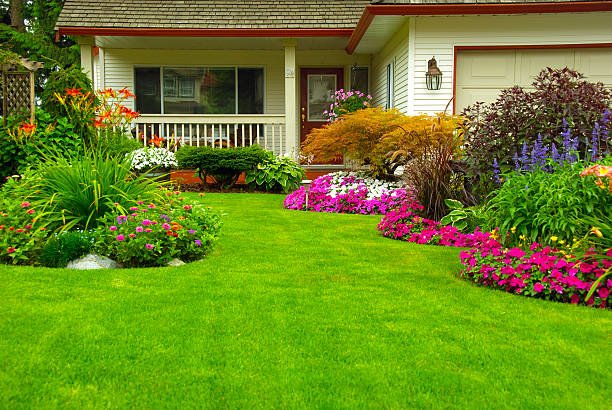
Introduction:
Home gardening is not merely a hobby but a profound, transformative practice that offers many benefits. From fostering better physical and mental health to promoting sustainability and strengthening communities, gardening touches every aspect of our lives. Whether you have a sprawling backyard or a small balcony, you can reap the rewards of home gardening. So, roll up your sleeves, pick up a shovel, and begin your journey to cultivate life in your garden. In doing so, you’ll not only nurture plants but also your well-being and the health of our planet.
Home gardening refers to cultivating and caring for plants, flowers, and other vegetation in and around one’s home or residential property. It encompasses various activities and tasks related to landscaping, planting, nurturing, and maintaining multiple vegetation types for aesthetic, recreational, and practical purposes.
What is the Importance of Home Gardening:
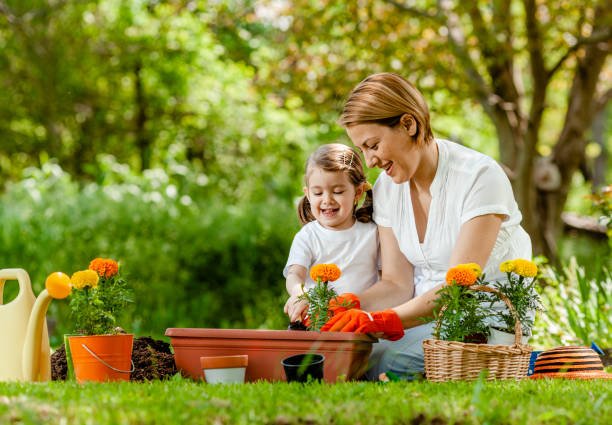
In today’s fast-paced world, many seek solace and a connection to nature through home gardening. This age-old practice isn’t just about tending to plants; it’s a profound way to enhance the quality of life. Home gardening provides myriad benefits for the individual and the environment, making it a valuable and timeless pursuit. In this article, we will study the importance and the numerous advantages of home gardening. Trusted source
- Health and Well-being:
One of the foremost reasons for home gardening is its positive impact on our health. Gardening is a physically engaging activity that promotes exercise, flexibility, and mobility. Fresh air and exposure to natural sunlight during gardening can also boost mood and combat stress, anxiety, and depression. Studies have shown that spending time in green spaces can lower cortisol levels, blood pressure, and overall well-being.
- Connection to Nature:
Many of us are detached from the natural world in an increasingly urbanized world. Home gardening allows individuals to reconnect with nature on a personal level. Tending to plants, observing their growth, and nurturing them through seasons fosters a deeper appreciation for the environment. This connection can instill a sense of responsibility towards nature, promoting sustainable and eco-friendly practices.
- Best Quality of Food:
Home gardening encourages individuals to grow food, reducing their reliance on mass-produced, often chemically treated crops. Vegetable gardens, herb gardens, and fruit trees in your backyard can provide a steady supply of fresh, organic produce. It contributes to personal food security and supports sustainable agricultural practices, reducing the carbon footprint associated with food transportation. Trusted source
- Enhanced Aesthetics:
A well-maintained garden enhances the aesthetics of your home and neighborhood. It adds color, texture, and life to outdoor spaces. Thoughtfully designed gardens can improve your property’s curb appeal and overall value. Gardens are a visual delight, whether a lush flower garden, a neatly trimmed hedge, or a serene water feature.
- Community and Social Interaction:
Gardening can be a communal activity that brings people together. Community gardens, in particular, provide spaces for neighbors to work collectively, exchange gardening tips, and build relationships. These shared spaces foster a sense of belonging and community cohesion.
- Educational Source:
Home gardening is an excellent educational source for children. It teaches them about biology, ecology, and the life cycle of plants. It encourages curiosity, responsibility, and patience as they watch seeds sprout and grow. Gardening can be a hands-on science lesson right in your backyard.
The Benefits of Home Gardening:

Home gardening is a creative and enjoyable hobby with numerous benefits, including improved mental and physical health, access to fresh produce, enhanced aesthetics, and a connection to nature. It permits individuals to express their personality and style while contributing positively to their environment and immediate surroundings. Home gardening can be fulfilling and rewarding, whether it’s a small balcony garden, a backyard oasis, or a community garden plot.
- Physical Fitness:
Home gardening involves various physical activities, from digging and weeding to planting and pruning. These activities provide a low-impact workout that promotes muscle strength, flexibility, and cardiovascular health. Regular gardening can help individuals stay active, especially those with limited mobility.
- Stress Reduction:
The act of gardening has a therapeutic effect on the mind. The connection to nature, the rhythm of gardening tasks, and the sense of accomplishment in nurturing plants can alleviate stress and improve mental well-being. Many people find solace and relaxation in their garden, using it as a sanctuary from the pressures of daily life.
- Sustainable Living:
Home gardening promotes sustainability by reducing the carbon footprint associated with food production and transportation. It encourages using organic and eco-friendly practices, such as composting, mulching, and avoiding chemical pesticides. These sustainable choices contribute to a healthier planet.
- Nutrition and Food Quality:
Growing your fruits, vegetables, and herbs ensures access to fresh, nutritious, and pesticide-free produce. Homegrown foods are often more flavorful and nutrient-rich than store-bought counterparts, making them a valuable addition to a healthy diet.
Relationship between Society, State, and Individual
Best health benefits of Strawberries
Environmental Benefits:

Home gardens are mini ecosystems that support biodiversity. Planting various flowers and shrubs attracts pollinators like bees and butterflies, who help pollinate other plants in the area. Home gardens also help purify the air by absorbing carbon dioxide and releasing oxygen.
- Economic Savings:
While there is an initial investment in home gardening tools, seeds, and plants, Home gardening can lead to significant long-term savings. Growing your produce and reducing the need for landscaping services can lower your grocery bills and expenses.
- Fresh Produce:
Vegetable and herb gardens provide a source of fresh, organic produce, reducing grocery bills and promoting a healthy lifestyle.
- Eco-Friendly:
Home gardening allows you to contribute positively to the environment by planting trees, flowers, and shrubs that support local wildlife and improve air quality.
1- Planning Your Garden:
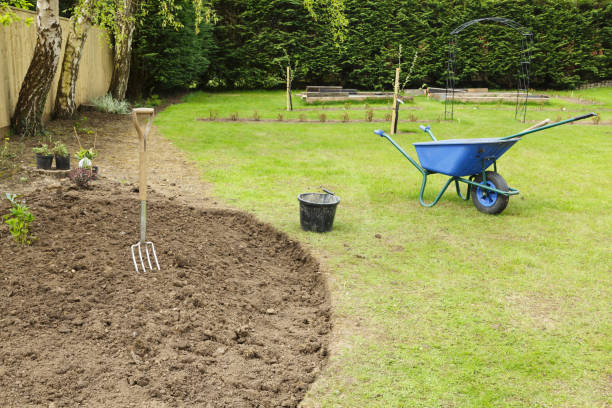
Choosing the Right Location:
- Assess your garden’s exposure to sunlight, wind, and water sources.
- Consider the aesthetic and practical aspects of your garden’s location with your home.
Garden Design:
- Decide on the garden style (e.g., formal, cottage, tropical) that suits your preferences and the architecture of your home.
- Plan pathways, seating areas, and focal points to create a harmonious and functional space.
Soil Preparation:
- Conduct a soil test to decide its pH and nutrient levels.
- Improve soil quality through organic matter and soil amendments.
Plant Selection:
- Research native plants and species that thrive in your region’s climate.
- Consider the color palette, growth habits, and maintenance requirements of the plants you choose.
2- Planting and Maintenance:
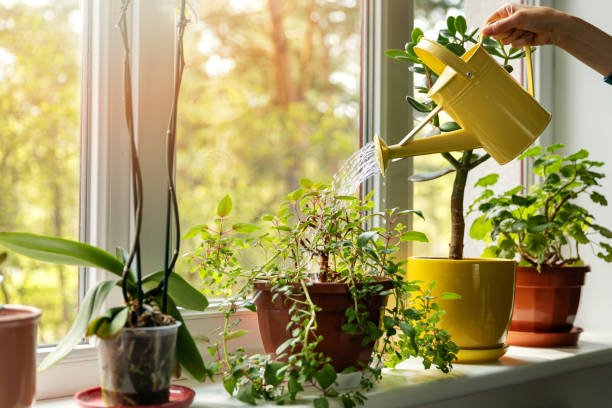
Planting Techniques:
- Follow proper spacing guidelines to allow plants to grow and breathe.
- Pay attention to planting depth and mulch to retain moisture and deter weeds.
Watering:
- Establish a regular watering schedule, considering the needs of different plant species.
- Use efficient irrigation methods like drip systems to conserve water.
Pruning and Deadheading:
- Prune shrubs and trees to maintain their shape and health.
- Deadhead spent flowers to encourage continuous blooming.
Fertilization:
- Understand the nutritional requirements of your plants and fertilize accordingly.
- Use organic fertilizers for sustainable garden management.
Pest and Disease Management:
- Identify common garden pests and diseases and implement preventive measures.
- Choose eco-friendly and non-toxic pest control methods whenever possible.
3- Garden Features and Accessories:

Garden Structures:
- Incorporate garden structures such as pergolas, arbors, and trellises for vertical interest and shade.
- Consider adding seating areas, like benches or swings, to enjoy your garden.
Garden Decor:
- Personalize your garden with decorative elements such as statues, fountains, and wind chimes.
- Use outdoor lighting to create ambiance and extend the Usable of your garden into the evening.
Containers and Raised Beds:
- Utilize containers and raised beds for gardening in limited spaces.
- Experiment with various container materials and sizes to suit your garden’s theme.
4- Specialized Gardens:

Herb Gardens:
- Grow a variety of herbs for Pure and medicinal purposes.
- Explore companion planting techniques to improve herb garden health.
Butterfly and Pollinator Gardens:
- Plant nectar-rich flowers to attract and support pollinators like bees and butterflies.
- Avoid the use of pesticides to protect these essential creatures.
Vegetable Gardens:
- Plan and rotate crops to maximize yield and prevent soil depletion.
- Practice sustainable gardening techniques like companion planting and organic pest control.
Water Gardens:
- Create a serene oasis with water features like ponds, waterfalls, and aquatic plants.
- Ensure proper maintenance to keep water gardens clean and healthy.
5- Sustainability and Eco-Friendly Gardening:

Organic Gardening:
- Embrace organic practices using organic soil, compost, and natural pest control methods.
- Avoid synthetic chemicals and genetically modified plants.
Rainwater Harvesting:
- Install rain barrels or reservoirs to collect and use rainwater for garden irrigation.
- Reduce your reliance on municipal water sources.
Composting:
- Establish a composting system to recycle organic kitchen and garden waste.
- Use compost to enrich your soil and reduce landfill waste.
Native Plants:
- Choose native plants adapted to your region’s climate and require less water and maintenance.
- Support local wildlife and biodiversity with native plantings.
6- Seasonal Gardening:
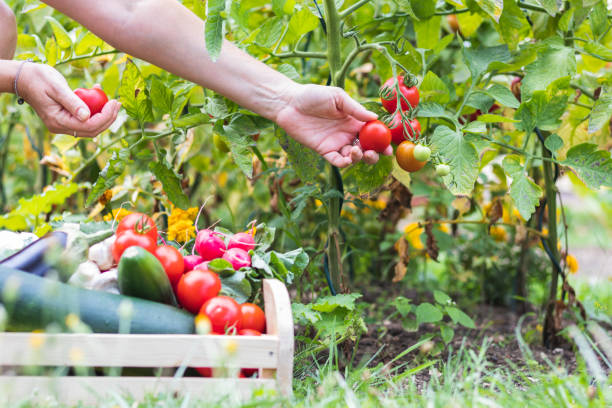
Spring Gardening:
- Plant spring bulbs, annuals, and early-season vegetables.
- Prune and divide perennials as needed.
Summer Gardening:
- Maintain regular watering and mulching to combat heat stress.
- Deadhead and fertilize to promote continuous flowering.
Fall Gardening:
- Plant fall-blooming bulbs and perennials.
- Prepare your garden for winter, cleaning up debris and protecting sensitive plants.
Winter Gardening:
- Plan and design your garden for winter interest with evergreen plants and ornamental grasses.
- Enjoy the tranquillity of your garden in the off-season.
7- Garden Challenges and Problem Solving:

Weeds:
- Identify common garden weeds and implement effective weed control strategies.
- Use mulch and ground covers to suppress weed growth.
Pests and Diseases:
- Recognize signs of common garden pests and diseases and take prompt action.
- Practice crop rotation and good garden hygiene to prevent infestations.
Extreme Weather:
- Prepare your garden for extreme weather events such as droughts, floods, and storms.
- Protect sensitive plants during cold snaps and heatwaves.
8- Garden Communities and Resources:
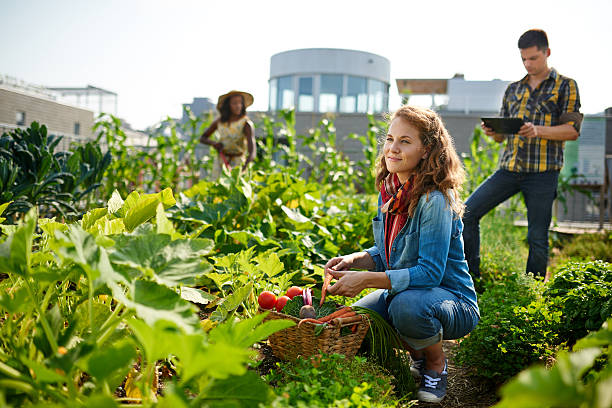
Joining Garden Clubs:
- Connect with like-minded gardeners in your community.
- Share knowledge, experiences, and plants with fellow enthusiasts.
Online Resources:
- Explore home gardening forums, websites, and social media groups for advice and inspiration.
- Access gardening apps and software to help plan and manage your garden.
Books and Magazines:
- Read home gardening books and magazines to deepen your knowledge and explore new ideas.
- Subscribe to publications that focus on specific home gardening interests.
Conclusion:
Home gardening is not just hobbies; it is a transformative experience that can enrich your life and the environment around you. From planning your garden and choosing the right plants to embracing sustainability and overcoming challenges, this comprehensive guide has covered every aspect of Home gardening.
By applying the principles and techniques discussed here, you can create a garden that enhances the beauty of your home, nourishes your soul and promotes a healthier planet. So, roll up your sleeves, put on your gardening gloves, and let your green journey begin!







